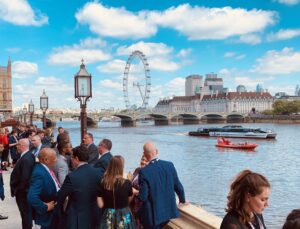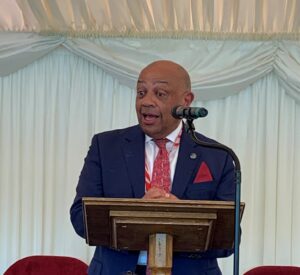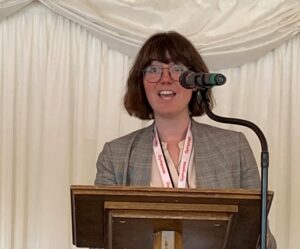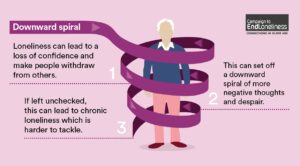SHP reports on a special event about overcoming loneliness in the workplace, held at The House of Lords and hosted by The Right Honourable Lord Boateng, in the build-up to Mental Health Awareness Week.
 A host of health, safety and wellbeing leaders with passion, expertise and a thirst to improve workplace health and wellbeing gathered at The House of Lords on Thursday 5 May, to learn about the Government’s 10-year Mental Health and Wellbeing plan and discuss loneliness in the workplace.
A host of health, safety and wellbeing leaders with passion, expertise and a thirst to improve workplace health and wellbeing gathered at The House of Lords on Thursday 5 May, to learn about the Government’s 10-year Mental Health and Wellbeing plan and discuss loneliness in the workplace.
The event, hosted by The Right Honourable Lord Boateng, was put together by Karl Simons OBE, Chief Customer Officer at FYLD, and speakers included Professor Sir Cary Cooper, present Chair of the UK National Health Forum, Zoe Seager, Deputy Director, Mental Health at Department of Health and Social Care, who spoke on behalf of the Government about the call for evidence consultation and Robin Hewings, from the charity, Campaign to End Loneliness.
After Karl’s introduction, Lord Boateng took to the stage with an impassioned welcoming address, saying, “the issue of mental health is a global issue. It’s a public health issue, but it’s also a development issue, and it’s an economic issue. Wherever we are from, the Sustainable Development Goals (SDGs) belong to us, and we have a commitment addressing in our SDGs the issue of health and wellbeing.”
Public Heath has always been at the forefront of Lord Boateng’s mind, he reflected on two campaigns which he was associated with in the 90s as a junior minister, that have stuck with him throughout his career. The first was a Handwashing Campaign, focussing on encouraging people to wash their hands. The second, was the Campaign Against Living Miserably (CALM). “That is all about addressing the issue of how hard it was to talk about our feelings, particularly for young men, and how that leads to a disproportionate impact and suicide.
‘Get up and do it’
 “I went on to do many other things in my career, such as Police Minister and Prisons Minister, but I never forgot those two campaigns. I was able to do something about public spending and the mental health service framework, when I was Chief Secretary to the Treasury, and we put some money and resource behind it. But the reality is, that the pandemic has really raised this issue, making us aware of just how important mental health is.
“I went on to do many other things in my career, such as Police Minister and Prisons Minister, but I never forgot those two campaigns. I was able to do something about public spending and the mental health service framework, when I was Chief Secretary to the Treasury, and we put some money and resource behind it. But the reality is, that the pandemic has really raised this issue, making us aware of just how important mental health is.
“When you look at what it costs business and the number of sick days lost, there can be no doubt that we have really to give this issue the prominence that it deserves. And when you look at the case for investment it seems to me that it’s an unanswerable one. Financial analysis, produced by the Lords in 2020, indicated that for every £1 spent by employers on mental health interventions they get £5 back in reduced absence, presenteeism and staff turnover.”
Load Boateng summed up by speaking about two take-away phrases for the assembled audience to think about. The first is an old South African proverb associated with Archbishop Tutu, ‘Ubuntu’, which means the essence of being human, “I am a person through other people. My humanity is tied to yours.” The second is a Zulu word, ‘Vukuzazi’, which means wake up and know yourself or, get up and do it.
10-year Mental Health & Wellbeing Plan
Zoe Seager, Deputy Director, Mental Health at Department of Health and Social Care, then took to the stage to discuss the government’s 10-year Mental Health & Wellbeing Plan, set out by the Secretary of State for Health and Social Care in April.
The government wants to make sure the people of all ages at risk of developing a metal health condition, of taking their life, receive help at an earlier stage, and that those who are unwell get the compassion and support the need from the HNS, social care and beyond. A ‘Discussion Paper’ has been launched to ask questions about what should be included in this Plan. The survey closes on 7 July 2022.

“The focus isn’t going to be on the NHS alone,” Zoe said. “It’s all of you and the companies you work for that we want to hear from. We want to understand, what are the barriers to making the changes that you want to see? What are the investments that you need from the government to do that? What will help you just deliver on your ambition for your workforce, your employees, yourself, your community?”
Zoe talked about what the government is currently doing around mental health. Since March 2020 it has invested an additional £500 million in mental health and developed a one-year cross-government action plan to support recovery and, earlier this month, it announced that 113 charities benefitted from a £5.4 million suicide prevent fund.
“We’re rolling out an Individual Placement and Support scheme, which offers route to employment for people with severe mental health conditions. This is a great example of moving towards a more holistic approach to creating a continuous cycle of not just treating isolation, because everything is connected to mental health and wellbeing and the majority of the population wants to work and would like more help to get back into employment.”
Good employment can lead to good health
“There is evidence that the employment enables recovery and contributes to health outcomes. Good employment can lead to good health and good health produces happier and more productive work. In the same way, we know that poor mental health costs employers.”
The event, which was sponsored by Gympass, was rounded out with an audience Q&A between Karl Simons and Professor Sir Cary Cooper, where Cary discussed his journey to becoming an academic, focussed on health and wellbeing, before Robin Hewings, from the charity, Campaign to End Loneliness, provided insight into chronic loneliness.

Click on the image to enlarge.
Robin discussed the downward spiral of loneliness and described loneliness as an unwanted, emotional response to a situation. He talked about how loneliness can make you feel, including feelings of distress, anxiety, the feeling of being abandoned and not being understood by others, feeling lost, helpless and empty.
“During lockdown,” Robin said, “people have been increasingly left to manage their own thoughts and feelings.” He provided a framework for what employers can do about loneliness, including looking at the company’s culture and infrastructure, looking at managers, people and networks and work and the workplace itself. On the design of an office, Robin noted that there has been evidence that open plan offices, often introduced to encourage interaction and collaboration between colleagues, can sometimes do the opposite, as people can feel anxious about having those interactions in full view and earshot of the whole office.
Click here to have your say on the Government’s 10-year Mental Health and Wellbeing plan.
Alastair Campbell on workplace mental ill-health
In this episode of the Safety & Health Podcast, we hear from former 10 Downing Street Director of Communications, Alastair Campbell, about the stigma around mental health in the workplace and tips for employers and those suffering with mental ill health. Also, we have a candid interview about suffering from burnout…
What makes us susceptible to burnout?
In this episode of the Safety & Health Podcast, ‘Burnout, stress and being human’, Heather Beach is joined by Stacy Thomson to discuss burnout, perfectionism and how to deal with burnout as an individual, as management and as an organisation.
We provide an insight on how to tackle burnout and why mental health is such a taboo subject, particularly in the workplace.

 A host of health, safety and wellbeing leaders with passion, expertise and a thirst to improve workplace health and wellbeing gathered at The House of Lords on Thursday 5 May, to learn about the
A host of health, safety and wellbeing leaders with passion, expertise and a thirst to improve workplace health and wellbeing gathered at The House of Lords on Thursday 5 May, to learn about the  “I went on to do many other things in my career, such as Police Minister and Prisons Minister, but I never forgot those two campaigns. I was able to do something about public spending and the mental health service framework, when I was Chief Secretary to the Treasury, and we put some money and resource behind it. But the reality is, that
“I went on to do many other things in my career, such as Police Minister and Prisons Minister, but I never forgot those two campaigns. I was able to do something about public spending and the mental health service framework, when I was Chief Secretary to the Treasury, and we put some money and resource behind it. But the reality is, that 

